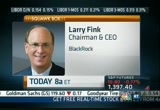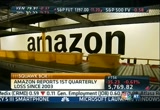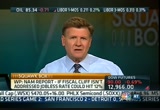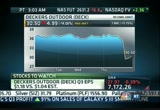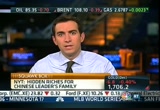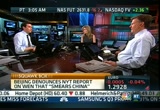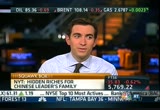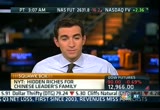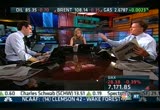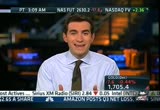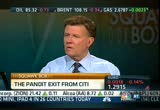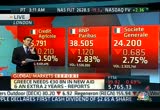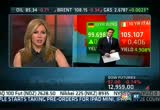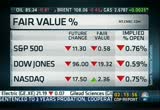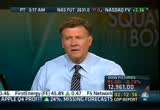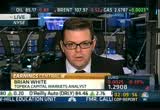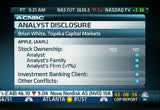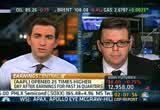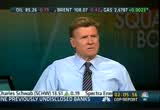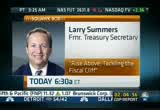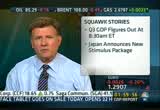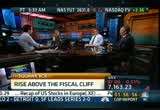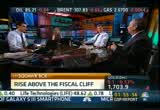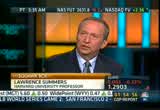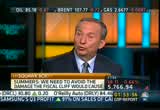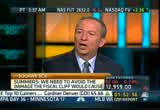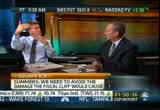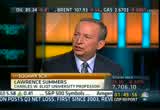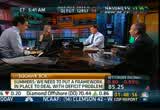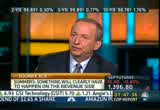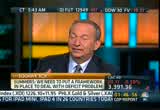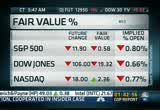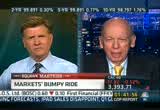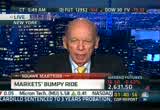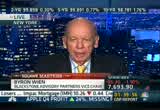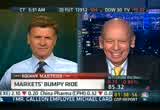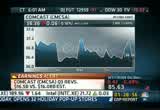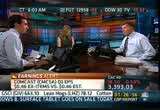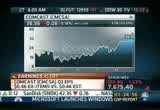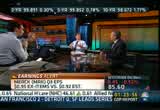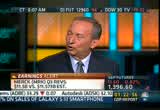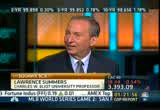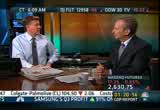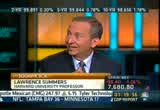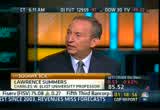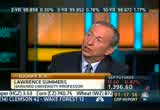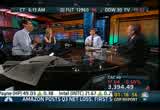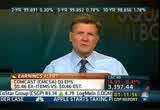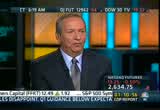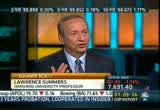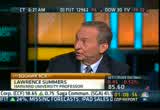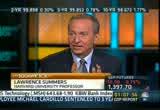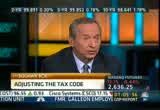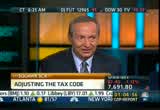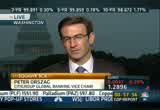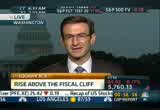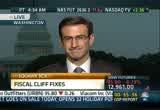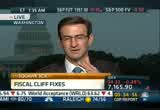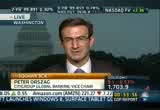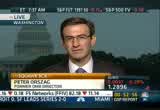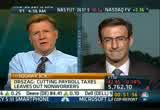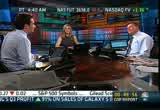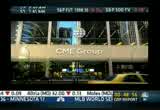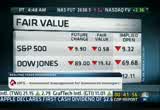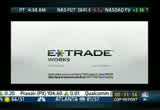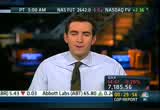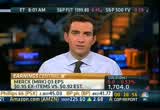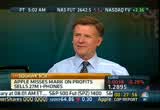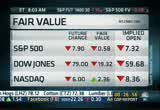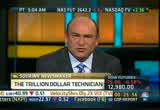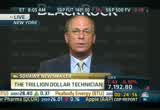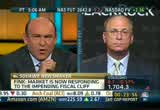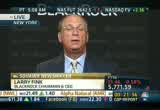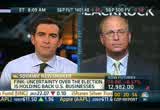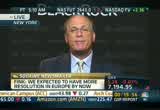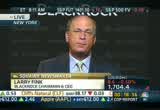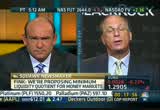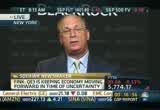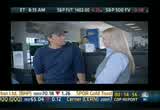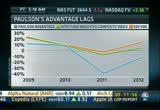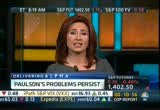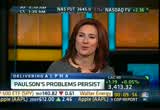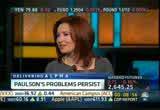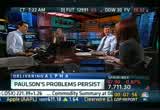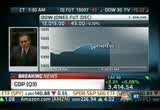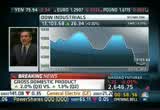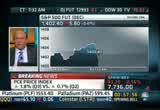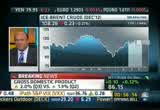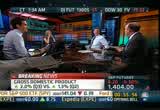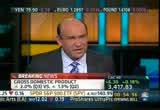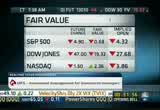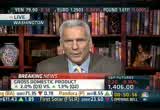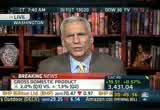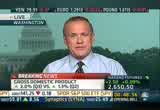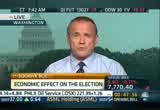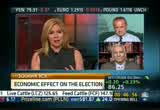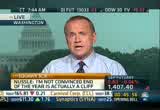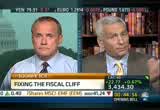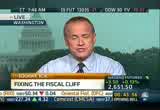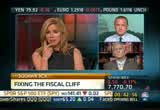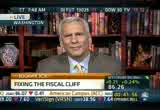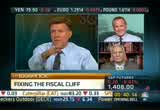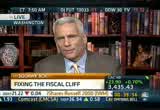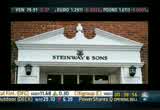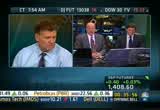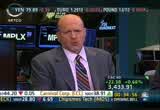tv Squawk Box CNBC October 26, 2012 6:00am-9:00am EDT
6:00 am
orszag. that comes up at 7:30 eastern time. and then at 8:00, blackrock chief larry fink will talk about equity markets. andrew has more of today's top stories. >> apple has missed the mark. profit fell shy of forecasts. revenue rose 27%. apple sold nearly 27 million iphones. the iphone 5 was released at the end of the quarter, but ipad sales were well short of forecasts. apple's first quarter guidance which includes the holiday shopping season also trailed analyst estimates. apple expects gross margins now of 36%. that's the lowest figure in about four years. the stock falling below $600 a share at one point. you can take a look at that as we speak. let's get on to amazon. reported a third quarter net loss, its first since 2003. results were hurt by a drop in the value of its stake in living social, competitor to groupon.
6:01 am
and as the company continues to spend heavily on expansion and product development and items like it new kindle line, revenue rose 27% also short of forecasts. am that son's further quarter sales outlook is now shy of analyst estimates and amazon shares did fall in late trading yesterday. you can see that on the board there. $221. and computers featuring microsoft windows 8 hitting store shelves today. the company is opening 32 pop up stores just for the holidays. it's designed to run on a variety of devices. pcs, lab tops and tablets. we heard from steve ballmer about it yesterday. joe. >> fiscal cliff still about two months away, but the combination of scheduled tax hikes and spending cuts may already be impacting the economy. the "washington post" citing a report by the national
6:02 am
association of manufacturer's says companies are bracing for the fallout by cutting jobs and delaying big purchases. government data shows business investment stalled in september. the report goes on to say if congress fails to address the cliff, 6 million jobs could be lost over the next year, that would push unemployment to near 12%. and what we're hearing is not a whole lot different than what we're hearing from the eceos. let's look at stocks that could move. expedia earned $1.32ed a share.. let's look at stocks that could move. expedia earned $1.32ed a share. results were driven by strong hotel bookings.d a share. results were driven by strong hotel bookings. a share. results were driven by strong hotel bookings. deckers 14 cents above estimates. revenue was short of consensus. an footwear maker also lowered current quarter guidance as sales of its ugg shoes declined.
6:03 am
i have a pair that are like canvas tops and i've worn them a lot. >> are they the ones that are fur lined? >> no. >> those are the traditional uggs. >> well, you know, when i wear them, penelope says i look like gilligan. they're dorky. and coin star earned $1.14 a share for the third quarter, one cent below estimates. coin star seeing weaker demand for its red box dvd rental business and, andrew, so much for that china bureau for the "new york times." just reading this now, these are communists. spread the wealth. >> $2.7 billion. let's explain what's happening. it takes big story this morning.
6:04 am
the "new york times" reporting this morning that family members of chinese prime minister wen quietly amassed a small fortune while he has been in power. the types says that his wife, son, daughter, young are brother, brother-in-law have become extraordinarily wealthy racking up assets worth $2.7 billion. the that i am names of relative hitting behind partnerships and investment vehicles using friends and business partners. the chinese government is denouncing the report saying it smears china and there are also reports that beijing is blocking the story on the internet. yesterday afternoon, i've known the story has been coming for a long time, a number of business people i know in china actually sent e-mails from g-mail accounts saying do not e-mail me, do not contact me from your times -- even for me. >> no matter who you are. >> it just come out within a half hour. it was like wildfire. and you're right, the "new york times" does have a bureau in china. they started a chinese language website. so this article is in chinese.
6:05 am
there are people that are finding ways to get around to get to the story. but it's an extraordinary story in part because wen has always presented himself as a man of the people. >> they always do. >> and throughout this whole period, his wife and so many of these individuals, all sorts of business partnership, government state sponsored -- incredible. >> what we're finding out is not surprising, but what's surprising is that in that country we never would have found this out before. and certainly their own domestic would never ever find out any of this. and in this case, i have to hand to the "times." there is a role for the "new york times" still. >> thank you. >> wen said in the past just talking about how he's kind of painted himself, he came from this poor background, but he's said in the past that leaders should ensure that family members and friends do not abuse government influences. p. >> and that's the other interesting aspect of the piece. while there is nowhere does it
6:06 am
say -- it's implied throughout, but unclear whether wen was actually endorsing any of this. in fact he talks religiously throughout the piece in other places from comments and questions that he's answered about how this exact issue, that the family may be abusing their power. >> he has to know that everyone around him just got -- >> the top 200 guys in china average net worth -- >> what's the number? >> no, but after reading this, do you think that it's -- >> no question. >> average is probably hundreds of billions of dollars for the top 200. >> and the other thing that's interesting, this was not an unsophisticated plan. meaning the mother-in-law is doing it through five different partnerships in other people's names. >> this is the only member of the ruling class that has amassed a fortune. and even in north korea, the ones that are -- that's how you keep people in line. >> how about david piece this together? >> he's been working on this for almost a year now.
6:07 am
it's been a long time p. i actually saw him a couple months ago and we spent time talking about the piece. and i knew it was going to come and i thought it would be powerful, but i didn't know how far he had gotten into it. >> a little surprising that the "times" it dispatch one of its reporters away from the romney investigation of his wealth to go over to china. they were able to spare him? probably a cadre working on romney. digging in to his garbage. >> david's invested a lot of his time. >> you ignore me. >> wise course. >> did you see victor pandit? >> you're trying to avoid this "wall street journal" editor kral. they channeled you. liberals confuse a pro-growth plea with a tax rate hike. this is the same discussion we had yesterday morning where we were talking semantics whether you call it a rise in tax revenues, lowering tax rates,
6:08 am
higher effective tax rates. you were taking it immediately as a stamp of approval from the ceos to raise taxes, which is what they're talking about is a pro-growth plan. >> all the ceos can say we agree, but once you actually get down to the devil and the detail, it will be much more -- >> so you lost that argument yesterday. so today you booked larry summers, peter orszag, jared bernstein. i'm going to be -- >> you'll be just fine. >> no, i'm not. high bladder is really acting you up. i'll be leaving a lot. >> vacating the set? >> dryeah. >> we do have peter orszag. there's a piece in the "new york times" that explains the cover, sort of the history of the pandit exit. we all woke up last week and he lost his job. he said that he had resigned on his own. it's an incredible story because what it explains is that the chairman, michael o'neal, literally had him come in the
6:09 am
office, he had no idea what was happening, the day after -- the day of the earnings report. just a regularly scheduled meeting. and he says i have tlooe press releases here. i have one press release that says that you are going to resign immediately. i have another press release take says you'll resign by the end of the year and another press release that says you've been fired without cause. what would you like to swleelec. >> this races questions about disclosure. obviously o'neal wasn't on the conference call, but to know you were going to spring it on him is -- i don't understand why it would go down that way. >> didn't pandit tell maria things that -- what did he tell her? >> pandit told maria and by the way told other reporters that it was his choice. >> out of the three. >> that's what we said at the time, that it was his decision to com bli with the request from the board to leave. whenever we read stuff and we see the stuff, we should know,
6:10 am
we he should be able to sift through -- >> people wonder why we're cynical. p. >> exactly. let's get a look at the markets very quickly. we have seen a lot of red arrows today after they ended modestly higher yesterday. this morning dow futures down by close to 80 points. ross westgate is standing by in london. ross, good morning. >> very good morning to you. we are weighted for the down side right now here in europe. about 8:2 decliners outpacing advancers. we bunsounced off the session l. right how losses just over half a percent for the ftse. xetra dax half percent. ibex down a percent. s&p coming out today and downgrading bnp which is the biggest french bank. the stock here down 2.8%. now, socgen and credit agricole weren't downgraded, but their outlook was cut to negative. s&p citing their vulnerability
6:11 am
to a possible recession in france. now, the thing about these today, these stocks have done incredibly well since july. the case of socgen, up 57%. bnp 47%. credit agricole up nearly 100% since late july. so they have had a huge rally from the middle of the summer. and so they are going to be vulnerable to any negative headlines at this point. and a lot of people saying banks having been a point of being undervalued are now overvalued, as well. so that's where we stand. with yields, italian and spanish yields slightly hire. ten year italian 4.9%. but we did have a zero coupon bond auction. ten year spanish yields still fairly contained. comfortable enough at the moment for the spanish government. gilt yields a little bit lower. that's where we stand in europe. back to you guys.
6:12 am
>> let's get a check on some of the other markets starting with oil prices. the futures you saw how weak they are. the markets really will be focusing on the third quarter gdp report. expectations are that it's going to come in at 1.9% which would be improvement over the first read. but people are watching this very closely. in the meantime, you can see how oil prices down around 73 cents. that shows you the concern about the economy. also take a look at the ten year note. this morning the yield is at 1.768%. so the yield has come down slightly from yesterday when it was above 1.8. dollar this morning is at this point stronger against the euro and the swiss franc. right now the euro at 1 .2912. first time we've seen it below 1.30 in a while. the yen and dollar at this point, dollar down against the yen. and you can see gold prices at this hour down by $8.30. $1704.40 an ounce. when we return, we'll talk more about apple, profits missing the hark there.
6:13 am
will the ipad mini give the next quarter a boost and how many iphone 5s do you need to sell to keep wall street happy. we'll find out right after this. and hurricane sandy making it way north. we'll get the storm track from the weather channel. that is next right here on squawk. [ horn honks ] hey, it's sandra -- from accounting. peter. i can see that you're busy... but you were gonna help us crunch the numbers for accounts receivable today. i mean i know that this is important. well, both are important. let's be clear. they are but this is important too. [ man ] the receivables. [ male announcer ] michelin knows it's better for xerox to help manage their finance processing. so they can focus on keeping the world moving. with xerox, you're ready for real ness.
6:15 am
6:16 am
about 10 1/2. a lot coming from the bad news from apple. not great news from amazon either. weakness across the board. time for squawk sports. tampa bay went into minnesota to take on the vikings. the bucs came away with the victory, 36-17. also the san francisco giants are halfway there. the giants beating the tigers in game two of the world series and they have a 2-0 lead in the best of seven series. >> predicted that on my very successful facebook, what was it, office hours. one of the questions hch-as a national leaguer, i have to go with the national league. i think the dh ruined baseball. but i said the giants in six. so i might be wrong because it might not be -- >> maybe four or five? >> they got the triple crown guy on detroit. they have to come eventually. hurricane sandy headed for new jersey. how do they know it's -- it's
6:17 am
such a small -- >> they've changed it. last night they were thinking right for new jersey. it's widened out since then. it could go miles per hour from de anywhere from delaware to cape cod. >> hurricane sandy on track to strike the east coast. alex, you've been doing this a while. in terms of -- how much can we really know? it's just probabilities at this point. i don't immediate need to put t windows up just yet, do i? >> it's more a situation of being alert and being aware that this system is out there. because at this point, it's looking more and more likely that there will be some impacts. just a matter of exactly where at this point.
6:18 am
but let's show you what's going on with it. right now 80 miles an hour sustained winds. moving to the northwest at 13 miles an hour. moving right now through the bahamas. the center of the circulation is right about in there. so most of the nasty weather is on the northern end of the system out over most of the open waters. but we're still feeling some impacts well out away from it. look how large the circulation is. we're talking impacts all the way down it puerto rico and over toward hispaniola. haiti getting a good dump of rain there. so not a good situation there with flooding problems. already start being it see outer fringes reach up to the carolinas. so where is it heading? the general motion of the east coast here for us and that's doctor we have some of these watches and warnings in place. still a hurricane warning up through the northwestern portion of the bahamas, but we have tropical storm warnings in the red for portions of the east coast of florida. so tropical storm conditions expected there in the next 44 hours. and then the newest information our tropical storm watches that are up for north of savannah all
6:19 am
the way up to the eastern sections of north carolina. potential path, here we go. it will snake its way to the north and west and then head east. so away from the east coast as we head through today and into early part of the weekend. but then what happens is it turns more back to the east coast end of the weekend in to early next week and you can see the large spread from north carolina care up to southern new england. those area need to be prepared. >> thank you, alex wallace. we appreciate it. a slowdown in ipad sales resulted in a miss for apple's fourth quarter. a big miss. joining us is brian white from topeka capital markets. i'll be tough with you. you have a $1111 price target on this stock. what is wrong with you? >> well, you know, i think apple is still significantly undervalued here. what was encouraging on the
6:20 am
december quarter outlook was the revenue guidance. so the real concern was over the gross margin. 36% for the december quarter. but the revenue outlook of $52 billion was actually very strong. >> why has the street been so off recently on apple? and i know for been years it felt like apple was sandbagging its numbers. but in the past couple of quarters, this seseems to have a regular occurrence. >> the iphone is ramping at a different time of the year. all started last september quarter when the iphone 4s launched in october. the street didn't exactly know how to model that seasonality. and you're seeing it again. and this iphone 5 is a much bigger launch than 4s. so people are really grappling with how do you model the seasonality. and i think the supply constraints obviously have been a big issue, as well. >> so do you listen to the call, look at the numbers and say, okay, this $1,000 target i have
6:21 am
making no sense anymore? >> it absolutely makes sense. we cullly raced our calendar 13 numbers, which is what our price target is based off of. so when you think about the gross margin of 36%, okay, it's down from 40% in september quarter, really what's happening is 80% of the december quarter revenue is from new products over the past six weeks. new form factors. a lot of transition costs as you ramp this up about so that this will come and go. i think they're being ultra conservative because they don't exactly know the impact in december quarter. so we would absolutely be buyers here. this revenue outlook -- >> with your arrest get, what would the market cap for the company be? >> just over a trillion dollars. it's 19 times earnings. very reasonable for a company that's growing at this rapid pace. >> how do you feel about the margin compression? because that was an issue that a number of analysts seem to be paying attention to yesterday.
6:22 am
this was the lowest margin number they had come out with, 36%. >> i would say at face value, it's a surprise. when you think about their commentary on the call, 80% of the revenue in december quarter are new products. we've never seen that in the history of the company. and that's in the past six weeks. so number one, it definitely has an impact. they've totally retrofitted the portfolio with new form factors. number two, they didn't totally know and they're being ultra conservative to make up for that lack of knowledge. >> do you have any sense that the replacement cycle will start slowing down? maybe less so for the phones, but more so for the pads? >> i think the ipad mini will change the game here. we said we think next year they'll sell 30 million and 48 million the next year. so i think in certain instance you'll have consumers go out and own a regular ipad and own an
6:23 am
ipad mini which goes on sale this morning. >> for you to get to your trillion dollar number, do they have to come out with a game changing device that we didn't know about, the itv? we had an analyst on yesterday that said they should buy tesla and get into the car -- all sorts of fantastical if not fantasies about what should happen. >> absolutely not. their market share in the core markets is tiny. so they still have a big opportunity to gain share in their markets. ipad mini opens up a whole new product opportunity in the lower end tablet. apple tv is something i think we'll hear about over the next year or so. it's obviously not out in the time people thought. but that is probably a $200 billion market for them. >> all right. we'll leave it there. we have 12 months to get you up to that trillion dollar mark. and we should keep talking. thank you so much for joining us. >> you got it. >> i think it's around 950
6:24 am
million shares. that way you don't need to know whether -- you can figure out where trillion dollars -- right now it's 609, and it's worth 578 billion. >> that's how you get to a market cap. >> exactly. so 950 million shares. so not a billion shares, but almost you could say there's a billion shares. and then even you could do -- >> even i could do it. we might have to do a special sorkin far value -- >> i like the 1111. i think it's kind of a skroek. you can't be that -- it's at 609. 1111? >> i feel a little better when they come up with numbers that aren't just round numbers. it means there is actually some math going into it. >> why not say 1,000. >> then you may think they just made it henry blodget taught u they make these numbers up. coming up, larry summers
6:25 am
will talk about everything from the financial cliff to what happens after the election. before you hit the road, here's your traveler's check. social media use is growing among business travelers. but how are they using facebook, twitter and more? find out next. [ male announcer ] you are a business pro. monarch of marketing analysis. with the ability to improve roi through seo all by cob. and you...rent from national. because only national lets you choose any car in the aisle... and go. you can even take a full-size or above, and still pay the mid-size price. i'm going b-i-g. [ male announcer ] good choice business pro. good choice.
6:29 am
overall, more than 40% still don't use social media on the road. good morning and welcome back for "squawk box" here on cn cnbc. headlines this morning, first reading of third quarter gdp due out in two hours. economists looking for an annual growth really of 1.8%. and that would be about half a point higher to the final reading that we had for the second quarter, which was 1.3%. the latest country to announce an economic stimulus program, japan. the country's cabinet approved a
6:30 am
$5.3 billion package double the size that many had originally expected. japan tries to avoid a recession. hard to tell in japan when you're, right in, a recession. and then disappointing -- right? after 20 years of pseudo recession. an disappointing quarterly results from the two tech giants, apple's quarterly results came in below estimates and amazon.com reported its first quarterly loss since 2003 reflecting what it does a lot of types when it makes investments. in this case it was new products like the kindle. also the negative impact of its stake in daily deals company living social. i know nothing about it. >> competes with groupon which has also lost its hair recently. >> single digits, right.
6:31 am
>> i'll get and yyou a mum onum that. >> we are looking at red arrows. dow futures down close to 80. s&p 500 off by 10. we did see a slight respite yesterday when we saw a gain of about 25 points on the dow. but it has been rough sledding recently for the stocks. and you can see that in the futures today. we did get a gdp reading at 8:30, the second read. and the guess is that that will be upgraded to growth of 1.9% for the quarter. street will be watching that very closely. also take a look at europe. you'll see in france, down by about 15 points. ftse down close to 40. and dax off by half a percent. in asia overnight, you saw there were red arrows across the board. shanghai com positive the down by 1.6%, the nikkei done by 1.3% and kospi off by 2.5%. oil prices reflecting some of these concern.
6:32 am
the dollar is stronger against the euro. down against the yen. euro at 1.2905. gold prices $1704.10 an ounce. fierces of falling off the fiscal cliff continues to be front and center as we approach the deadline. it's a little more than two months away, something like 67 days. so what can we do to try to avoid going over that cliff and maybe more importantly how do we address the big gap that exists, whether we kick the can down the road or not. we have a squawk news maker with us for the next hour. larry summers, former treasury secretary and professor at harvard. professor, mr. secretary, great to have you here today. >> good to be with you. >> we need a lot of solutions. we started looking at the fiscal
6:33 am
cliff and we heard yesterday they have about 80 ceos who have tried on to try to push something like simpson-bowles type of plan to say this needs to be addressed quickly. how important is it that we come up with a solution? >> look, we're taking an economy that is growing but still vulnerable. and if we didn't do something about the fiscal cliff and we let all the sequester go into effect, let all the tax increases go into effect, you're looking at an overwhelming likelihood of serious recession and you're looking at a real threat to national security. it's not a tenable outcome to allow us to plunge over that fiscal cliff. two things that are important. one is we need to prevent huge damage to the economy in the short run. this is exactly the wrong time to take massive demand out. second, we need to put in place a framework so that markets look
6:34 am
and they see that after the economy recovers, whenever that comes, it will take time. after the economy is fully recovered, the nation's finances are sustainable. you don't have that, it will be very hard to put back confidence. so it's both the avoidance of damage, taking steps to move the economy forward in the short run that's essential, and because growth is really a crucial part of that long term fiscal picture, and it's longer term measures to have our finances be on a sustainable path. >> bill gross has an op-ed in the "washington post" today, and he says that even simpson-bowles, the plan that they've been looking at, isn't nearly enough to tackle this. he says cbo is looking at a gap of $1.6 trillion a year that we need to cut and he says that's four times as much as the plan the super committee has even come up with. and we can't even reach agreement on that.
6:35 am
>> i'm not sure that his numbers are quite right. after all, growing an economy, you can have hasome deficit and still be working off your debt just like a household is paying down its mortgage. but i think there's much more risk that we will not do enough about the budget deficit than there is that we will overperform and do too much through policy about the deficit. you know, i was fortunate enough to be treasury secretary at the end of president clinton's administration, the only time in the last 60 years when we were actually paying down debt and running a surplus. and if you look back at that experience, some of that experience was of course that there was a package and it took steps on expenditures and took steps on revenues. but part of that package was
6:36 am
that there was a credible growth strategy for the country that got the economy growing faster and created a virtuous circle that's exactly the opposite of what we had during the bush years. you have more growth, that means you have better revenues, better budget, that means you have lower interest rate, that means you have more investment, more growth. that's the kind of virtuous circle that we need to set off. that's why i think it's so unfortunate that so little has been done. the congress has been willing to do so little to prevent damage to the economy over the last two years. why is this the moment when we should be laying off teachers? why is this the moment when investment in fixing our infrastructure when interest rates have never been lower, when construction on employment hasner been higher, why isn't this a moment when we're doing
6:37 am
more rather than less to get a growth strategy going? surely this is a moment when the emphasis should be on getting money to people who are going to spend it. those seem to me to be crucial priorities for right now. >> larry, do you have just a number for how much the government has grown since the end of the clinton administration? because it's grown every year and it's obviously much bigger at this point. >> if you look at permanent -- i don't have a number. what is true is that most of that permanent growth that did take place took place during the eight years before president obama was elected. president obama did put this place a temporary set of measures to push the economy forward. recovery act in 2009. but the vast majority of that
6:38 am
has rolled off by now. he has actually pushed for and signed into law larger cuts in domestic discretionary spending than we've seen in a very long time. and actually larger cuts in domestic discretionary spending than the simpson bowles commission wanted to see. there's no question that containing the scale of government is an important part of this. but there's also no question as the ceos recognized yesterday that something's going to have to happen on the revenue side. we're collecting now less than 16% of our gdp in revenues. that is lower than anytime since the second world war. >> but just as people argue that 25% that we're speaking, part of that we need to spend because we've been through this very deep recession, and also part of the reason that we're at 16% on
6:39 am
the revenue side is because we've just been through this very deep recession where glet is very slow. how much would growth solve both ends of that is th? if we did glow at row at 4%, sp goes down and growth goes up. >> i think even on the most optimistic forecasts, you'd certainly need 1%, 2%, perhaps more% of percent of gdp to bri about -- at least and perhaps more in order to get the fiscal situation to a healthy -- >> that's not as bad as nine points. >> no, the nine is not a realistic figure because there will be at some stage a recovery. but look, we got to focus on doing things that are necessary to plow that recovery.
6:40 am
that means getting industries going, that means making crucial public investments. that means not choosing this moment to take a lot of demand out of the economy by forcing big time retrenchment. >> the only problem is that we've spent -- we have $5 trillion in deficits we built up over the last four years. and people say what were we doing with that money. where has it gone. should we have spent it differently than we have. >> becky, you never do something that is large in government and -- or in the private sector and have it be done perfectly. but we're in important ways a different and better country because of that investment. we are on the road now. we're not there, but we're on the road to really changing the quality of american education through the race to the top
6:41 am
program. we have re-energized in important ways what we can do in clean energy. of course there are investments that worked out badly. that's why it's called venture capital. sometimes the investments don't work out ability tnd the ones t out in a major way have huge and continuing impacts. across this country you see much improved -- a long way to grow on maintenance, but you see improvement in the quality of the country's infrastructure after a decade when the quality of that infrastructure was lagging very badly. so there is a great deal -- i was just at a meeting in boston at an institute that was formed
6:42 am
by harvard to take advantage of everything that came from sequencing the genome. they've made real progress on being able to target cancer drugs and other drugs better and what i was frankly as soutound what i was frankly as soutouned learn was that a significant part of that progress was related to funding that had come from the incrementses to t to t national institutes of health associated with the recovery act. nobody gets those medicines will ever say thank you to the recovery act, but the truth is that over time, these investments channel through in very important ways. i just wish we could get more consensus away from the radicalism of both sides. >> i agree 100%. good radicalism that thinks everything can be solved with
6:43 am
new spending and that every program once it's put in place needs to stay in place permanently. radicalism thanks there is no role for public investment. >> let's come back and we'll talk more about that. our guest host is former treasury secretary larry summers and that's a great point to pick up when we come back from commercial. coming up, we have squawk market master will tell us how the fiscal cliff will impact the markets. comments or questions, squawk@cnbc.c squawk@cnbc.com. duff & phelps finds the sweet spot that powers sound decisions. duff & phelps financial advisory and investment banking services.
6:45 am
6:47 am
we managed after a see saw session -- that's another one not easy. yesterday we managed to close up about 24 points. first gain in three days. will the pick up continue into next week? byron wein from blackstone, $205 billion assets under management. i don't know how many years i need to go back for when you were saying things are pretty good and the markets, you know, we've already told you that you've been wright a few times about it. are you still long term? i mean, is everything the same in terms of feeling pretty good about things? are the latest revenue shortfall first time since '09 that we've had revenue really disappointing. are you getting a little bit
6:48 am
less bullish near or ent intermediate term? good it's fa >> it's fair to say the events of the past month or so have made me more cautious. but the fiscal cliff larry is talking about is a critical issue. the way you look at it, it's $547 million, about 3.5% of gdp, an economy growing at 2% or 2.5%, you hit the economy with 3.5%, and then you're surely in a recession. both parties, i don't know who lin t win the election, but both candidates will defer an important part of it, but part of it will be tough to defer. so let's say you get 1.5% that filters into the economy. that would slow the economy at 2.5% down. there will be an offset to that because housing is bottoming this year. and going to be recovering.
6:49 am
so maybe you get a half to 1%. but at best, you've got a feeble economy now that's going to stay feeble in 2013. >> it almost sounds like you're already assuming a housing rebound. because we're in the at 2.5%. maybe we will be after today. >> i think the fourth quarter will be better. >> because of housing. and then you're talking about the fiscal cliff which is going to be -- we need two words, two terms. we'll use fiscal abyss for what happens long term. fiscal cliff we got it just handle that short time, but then we have everything else we're worried about that we need long term structure all changes for. so that's a totally separate issue, right? >> separate issue, right? >> joe, we only do the right thing in this country, we're a
6:50 am
democracy, and there's so much -- so many different opinions, you only get things done when you're facing a crisis, i think you're facing a crisis here, and, therefore, no matter who wins the presidency, he's got to bring congress together. for 60 years the government expenditures were 20% of gdp. tax revenues were 18%. we had a 2% gap we could live with that. >> right. >> my numbers are a little different from larry's, but at best it's 24% and 17%, 7% gap. we've got to bring that together. we've got to revise -- we can't just tweak the tax code. we've got to revise the tax code. >> byron, are you scheduled to come in and guest host again? because someone is telling me that i have to keep it short with you and i'm the one that has to tell you, but his name is rob cantino and he's in the control room, if you want to call up and yell at him. but come -- you'll be in to guest host, soon, and we'll talk a lot longer.
6:51 am
i apologize for rob. >> okay. >> all right. we'll see you. okay, coming up we've got more with larry summers, and later we've got another larry who has his name connected with a possible seat in the cabinet, blackrock's larry fink will talk the economy and markets and much more at 8:00 a.m. eastern time.
6:52 am
wooohooo....hahaahahaha! oh...there you go. wooohooo....hahaahahaha! i'm gonna stand up to her! no you're not. i know. you know ronny folks who save hundreds of dollars switching to geico sure are happy. how happy are they jimmy? happier than a witch in a broom factory. get happy. get geico. fifteen minutes could save you fifteen percent or more.
6:53 am
[ horn honks ] hey, it's sandra -- from accounting. peter. i can see that you're busy... but you were gonna help us crunch the numbers for accounts receivable today. i mean i know that this is important. well, both are important. let's be clear. they are but this is important too. [ man ] the receivables. [ male announcer ] michelin knows it's better for xerox to help manage their finance processing. so they can focus on keeping the world moving. with xerox, you're ready for real business.
6:55 am
that we report news of one of our own. yesterday in new york city the family of kevin krim our head of digital operations was the victim of an incomprehensible crime. two of his children tragically and also sadly died. in a statement to the staff cnbc president mark hoffman said, there is simply no words to convey the magnitude of this tragedy. what we can do is come together to express our unwavering support for a friend in need. all of us at cnbc and at nbc universal will be there for kevin, marina and their family. we ask that you our viewers keep his family in your hearts as we do we, his friends and colleagues here at cnbc. [ male announcer ] you are a business pro.
6:56 am
governor of getting it done. you know how to dance... with a deadline. and you...rent from national. because only national lets you choose any car in the aisle... and go. you can even take a full-size or above, and still pay the mid-size price. this is awesome. [ male announcer ] yes, it is, business pro. yes, it is. go national. go like a pro.
6:59 am
rising above to find america's fiscal solutions. >> we need to prevent huge damage to the economy in the short run. this is exactly the wrong time to take massive demand out. >> more with former treasury secretary larry summers. and former white house budget director peter orszag is here to add up the cost and tells us what to do to avoid the fiscal cliff. and what's at stake for your portfolio? get the names that could move the markets and make you money. the second hour of "squawk box" begins right now. good morning, everyone, welcome back to "squawk box" here on cnbc. i'm becky quick along with andrew ross sorkin and joe kernen. we've been watching the futures and they are under pressure, down about 78 points. the s&p futures are off 10.5
7:00 am
points. and some of the news is because of the earnings, apple shares under pressure after the fiscal fourth quarter profits fell short of the street expectations and its current quarter forecast also is below what the street was expecting. apple told fewer ipads than analysts had been expecting and the stock sitting near its lowest levels since early august after that news. also the prospect of the so-called fiscal glif is already hurting the economy according to a new study. the national association of manufacturers says that the prospect of higher taxes and spending cuts has cost job cuts and the reluctance to spend by business because of this uncertainty. walmart, by the way, is planning to open 100 new stores in china over the next three years. the world's largest retailer already has 370 stores and more than 100,000 workers in china. it is hoping to take further advantage of china's booming hyper market sector. joe? we are getting some results from our parent company. from our parent company, our 51% parent company. we did ge last week.
7:01 am
comcast is reporting earnings per share. the cap number is 78 cents and that would be up 136.4%. however, if you adjust for some gains one from the spectrum company sale, also the sale of nbc universal's interest in a & e, earnings are 46 cents on an apples-to-apples basis, in line with street expectations. however, that adjustments earnings per share number was 39.4% above the 33% reported in the year ago quarter. so, it was 136% if you leave the gains in. but even apples to apples up 39.4%. with a company like comcast people look at a lot of different things like consolidated free cash flow, $1.5 billion that was up 8.8% and it compared to -- there was actually a street estimate for consolidated for fcs, it was
7:02 am
$1.2 billion, $1.5 billion, $300 billion above that. total consolidated revenue was $16.5 billion. that was up 15.4% but we got to point out that the olympics occurred in the quarter. if you factor out the olympics, it was up 7.1%. operating cash flow was up 9.5% and that totaled 5 blth if you take out the olympics, it was 6.9% -- up 6.9%. and then if you're interested, the company paid $435 million in dividends, bought $750 million worth of stock. nbc universal is improving greatly. you can see that. but the standout performer just looking at these numbers -- >> right there. >> "squawk box", you know, they don't mention it specifically, andrew. >> i thought they were going to break it out this time. >> they don't -- i feel that in there there trying to signal it was an important component.
7:03 am
>> got to read between the lines. >> however, my point is the cable business comcast brought to the table before -- with the nbc, it's a huge home run. total video, high speed, internet and voice adds 249,000, that's way% more than in the third quarter of last year in terms of adds. and then i guess you look at at&t and verizon, they had a combined loss of 50,000 broadband customers in the quarter. whereas, i don't know if you take cable and you made the wrong move to fios. you little brown-noser, you did. what, do you have both? >> no. >> good. okay, it's good that now you are living with xfinity. >> great. >> high speed customers up
7:04 am
10.1%. and video customer loss continued to improve. and then as far as -- you probably are -- did you look at nbc? andrew, are you looking at this? >> i'm not looking at it right this second. >> you're not going to help me out? >> there are other things crossing the table. >> however, let me tell you about nbc universal, if you exclude the olympics, revenue was up 8.3%, if you include it, it was 31%. operating dark flow at nbc universal also improved and cable networks revenue was up as well. i guess if there's one thing that looked like it was -- well, no. it's -- it's a pretty clean and solid quarter. and the only thing i'd -- comment i'd make about the stock, you say this -- all these look pretty good, it's up 50%, really, in the last -- i don't know whether it's a year, but it was at 24 not too long ago. there's a three-month chart. we went back a little bit longer than that, you would see a year ago it was about a $24 stock and
7:05 am
it is now $36. so, as stocks many times do, it was anticipating improving conditions. you want to do -- what do we have, merck? >> the nongaap earnings per share was better than the street was expecting. also they are offering some guidance. they're now talking. a full-year non-gaap target of 78 to 382. that looks about where the street is right now. street is at 381 for that. and they are also talk about if you exclude -- or the gaap eps is 2 way to three 24 and it looks like it's in line with expectation. the stock up 1% premarket. >> we are heading into the final two weeks before the -- actually, it's less than that now and it's still too close to call. turning now back to our guest host this morning, before we talk about the race, treasury secretary, we talked off camera
7:06 am
about what we're on the cusp of in terms of biological science and discovery. we just mentioned merck, and it's amazing what -- and your point is that this is a time if you're going to, you know, tighten your belt, hopefully you're not going to tighten your belt on things like basic science. >> i think we got a number of opportunities in this economy. we've got opportunities for a housing turnaround. we've got huge opportunities in the energy sector that everybody talks about. you know, there's a silver lining in those earnings numbers that you mentioned. if you listen to what the company said, a lot of the reason the earnings were depressed was that they were making a lot of long-term investments in the future of those companies in the technology industry, apple and amazon today, but across information technology. and i am struck as i look out that in the late '80s people used to say computers were everywhere except the productivity statistics. and then we had the information technology receive institution.
7:07 am
it's been a decade since -- a little more since we siconsequenced the genome. there are incredible things happening in the life sciences. i think there's the possibility that over the next 10 to 15 years that that is going to yield huge benefits, huge benefits in terms of new treatments in fapharmacology, he benefits for agriculture and that's an area where thanks to government research from -- >> life science. >> -- there is no question that the united states is the world leader. and so i think as we look ahead, there's plenty of stuff and we'll come back to it in a minute that we've got to work through. but if we can keep doing the kind of thing -- look, it was government that brought you the lewis and clark expedition in the west. it was government that brought you the transcontinental
7:08 am
railroad, the internet had its roots in a basic research program. if we don't do the crazy thing and slash it to the bone, if we recognize that we got to make -- we got to address the budget deficit and we will address the budget deficit, but we got to address the r&d deficit, we got to address the maintenance deficit and we got to address the education deficit. we address all those deficits, we have huge potential over the next 10 to 20 years. and growth is the best way to prepare for an aging society. it's the best way to impact on what's going to happen to budgets. and that's why i think this question of whether we have a balanced strategy or an anti-government strategy is so important going forward. >> but here's the one thing that i would say, and it almost worries me that we're all going to, you know -- we're all going to be living a lot longer and
7:09 am
we're all going to have a lot more -- the availability of better and even more expensive medication. but what will probably happen is because a lot of our advances will come in pharmacology it might actually be cheaper the stuff we're able to do, that may not require hospital stays and surgery, we may actually be able to prevent things with pills. the one thing i will say the government is there at the beginning, but think about the way things are commercialized and think about the way the private sector delivers the innovation because of the machine that it is in moving things forward. and i worry about government health care. i worry about obama care. i worry about innovation being stifled. i look at europe and whatever you want to attribute their lack of innovation to in, you know, pharmaceuticals or medical devices, there's something that went wrong over there in their system because we're delivering all of it here now. >> you know, i think that's a hugely important point. i know that the president's science advisers have been
7:10 am
working with the fda on a set of changes that will enable much more rapid movement of drugs. the reason electronic medical records are so important is that if you're able to combine that information, you can catch it when there's a problem. you can act on it when there's a huge opportunity in terms of a drug working, and you can move to better decision making about those drugs much more quickly. that's why that was an important thing to be encouraging. you know, if you look -- you have to be fair about this. and everybody laughs at government and complains about government. >> right. >> if you look at the electronic medical records that they have in the veterans administrati administration -- >> right. much smaller, it's hard to do that with -- it's hard to do it with 300 million. >> -- they permit a much greater use of that information to assess treatments and improve treatments than in other parts.
7:11 am
but, look, you are absolutely right, and it is a great -- it is a besetting danger that -- we decide that we're just going to squash down on anybody who provides anything -- >> right. >> -- we would do great damage to innovation. but i don't see any evidence that that's what we're doing. i think we're recognizing that the right kinds of investments, some of it is, as you say, pharmaceuticals. some of it is public health measures, getting people to eat and exercise and -- >> right. >> -- in better ways. some of it is better, earlier detection and prevention. if we make the right kinds of investments, that can contribute to lower costs. also by keeping people healthier longer, helping people work longer, that can make an important contribution to
7:12 am
addressing -- to addressing entitlements. look, everybody knows what side i'm on. but i think when we've got a system where now everybody gets access to health care, except in a way that doesn't involve going to an emergency room, that is a big step for enabling us to take advantage of all of what technology is going to bring. i think they're going to be some huge human opportunities in all of this. and they're going to be some very real commercial opportunities. it's not been an easy period for pharma, but often it's darkest before the dawn. and sitting at a university i can tell you there are remarkable things happening in life science laboratories because we have been able to provide crucial support. god knows we better make sure -- >> you see it happening -- you can see it at m.i.t. happening i guess, you are close enough to
7:13 am
see the real advances happening there. you're close enough -- >> that was good, joe. that was good, joe. m.i.t. and harvard collaborate very well. >> no. absolutely. i guess if it's not a step -- and i know it's not a step to single payer, it's not baby steps to single payer, but i do worry about how many private companies eventually allow the government to handle it. if we ever did get to single payer, would you at that point acknowledge that innovation might be a problem? or still not? >> we got to single payer, there would be enormous risks in that one would have to be extremely careful about -- but, joe, we're not headed in this country for a single payer system. and if you look, you know, as president of harvard i had responsibilities with respect to teaching hospitals. there was a great deal that our medicare program did that actually supported the academic
7:14 am
medicine which is the source for most of this progress. we've got to make sure we keep maintaining that kind of -- that kind of support. but, look, this is a -- >> disappointing andrew. we're not going to single payer. >> this is very hard -- >> i'm not a single payer guy. >> you've said that in the past, you think that's probably the way to go eventually, single payer? >> i've not said that. i want innovation. >> i want to get the tape. >> write it down today. >> you have romnesia? >> i don't. we will be back with some final thoughts. we've got to take another break with our guest host, esteemed guest host, secretary larry summers. okay. we're going to have more -- i'm say spg the same thing. we'll have more with larry in a moment, but at the top of the hour the other larry, larry fink from blackrock, he'll talk about the chances of a first quarter recession and the looming fiscal cliff. from 17 billion chips worldwide
7:15 am
7:17 am
7:18 am
and headed lower today. comcast is out with quarterly results. the company earned 46 cents a share excludeing certain items, and the company added 294,000 new voice, video, and high speed internet customers up 28.1% a year ago. were you one of those? >> yes, she added. >> no? >> she's going to help us next quarter. we're back with our guest host this morning for some final thoughts former treasury secretary larry summers and i have three pieces of business to do with you. the first question is a political one, there is -- i don't know if it's the conventional wisdom but a view if romney wins when it comes to the fiscal cliff the can will be kicked and we'll be dealing with it in the spring and that may be a better outcome than if obama wins and the issue is forced. do you believe that? >> no. i think if the president is
7:19 am
elected, he will move -- when the president is elected, he will move quickly and forthrightly to strike a deal that avoids this risk of recession -- i don't think any political figure can in washington right now can afford to take steps that would push the economy into recession. will a whole bargain be worked out in the next two months? it's possible. i certainly wouldn't want to promise that that will happen. but with the president calling for a balanced approach, with that call being echoed by the business community, with 80 ceos that recognized that we needed that kind of balanced approach, i think that the pieces are all falling into place. frankly i think the much greater risk is that if the election went the other way and you had governor romney calling the
7:20 am
shots, with an unbalanced approach that's not even supported by the business community, and not even supported by prominent exofficeholders in his own party, that there would be no -- no approach we'd be moving towards and then it would be much harder to get something done on the fiscal cliff. >> however, mr. secretary, the wu one thing that the business leaders came out with they are not coming down on either side. the problem with the president and the administration is they've not come up with a plan to attack entitlements and that's a real part of the fiscal cliff. >> you do not like the 20% cut in rates or a figure we can't do it, it doesn't add up but simpson/bowles is a 28% rate, and mine nus 35 is 28. you must be against simpson/bowles, then? >> i think the broad principles of simpson/bowles are exactly right. i believe as the president believes that the national
7:21 am
security cuts in simpson-bowles are untenable. they're as bad as a sequester, they would do real damage to our national -- >> how about that? >> plugging the base is exactly the right thing to do and we should lower the rates as much as we can consistent with getting to that kind of balanced budget. i'd be prepared -- i'm not an elected -- i'm not an elected official. i'd be prepared to go as far as anybody wants to go on broadening the tax base, but when you start talking about taking away the charitable deductions -- >> we've got to figure out what to do -- >> got to figure out what we're going to do on the base, how much we can broaden the base and then we can see what we're able to do on rates. let's just start with that 20% cut especially when you're loading on $2 trillion of defense spending. >> right. >> and you're maintaining the bush tax cuts, that is -- that
7:22 am
is $8 trillion, and, you know, people have done this. if you take every single tax expenditure that there is, it goes to a person over $250,000, every single tax expenditure, it is much less than the $8 trillion that are on -- >> what about capital gains and dividends? what if those went up to 28%? >> as part of -- as part of -- >> that would raise a lot of money. that would solve the -- that would solve the -- >> i think there's a case on both sides, actually, joe. there's a case for -- particularly for smaller businesses for preserving a very strong entrepreneurial incentive with respect to capital gains. i think there's also a case that as part of everybody paying, those rates can be adjusted a bit. we did this -- we did this pretty well during the clinton administration. we had a tax code where rates were lower than they've been when dwight eisenhower was president or when ronald reagan
7:23 am
was president and the economy grew remarkably. i don't see how the responsible thing in a country with trillions of dollars of deficits that can look back to the clinton tax period is not to at least start by making those adju adjustments. then let's absolutely try to get the special interests out of the tax code and let's do as much as we can. >> we've been debating this in terms of what the ceos were saying yesterday in -- >> lower the rates. >> lowering the rates but there would be an effective tax rate would ultimately go up. >> we want to raise tax revenue, just not tax rates. >> we've got to broaden the base as much as we can. i think it's irresponsible to eat dessert before you have your main course and especially before you have your vegetables. that's why i don't think we should be talking about cutting the rates so much until we know what we're actually going to be willing to do in terms of broadening the base. so, the right question to ask those ceos --
7:24 am
>> right. >> -- is everybody supports their objective. on the corporate side, what are the base broadeners that they're for and how much rate reduction will those -- >> do you buy that they are really for getting rid of all these deductions, when well get down to brass tacks, what do you really think will happen? >> i think there are differing views. i think it's easier to be for reducing deductions in principle than it is with names on them. and so i think it's complicated that way. but, look, that is exactly the attempt and the strategy that we should pursue. it's just let's not make the mistake of focusing on the dessert, tax cutting, until we know what we can get with revenue. and the $8 trillion, again, let me just repeat, there is no credible economist who has denied that if you try to do the
7:25 am
$8 trillion -- >> right. >> -- even if you get rid of every single tax expenditure -- >> right. >> -- for those with incomes over $250,000 the arithmetic does not add up. >> i one more piece of business to do with you. since you are monolithic, the ceo is one person, do you think they really want to give up their deduction? >> they're all scum. >> that's not what i'm saying at all. no, no, no, look -- i love the business world. i want the business world to do well. my question for larry is this, there is a view that mr. -- it's not a view. mr. geithner is going to be stepping down at the end of this year no matter what, either whether obama wins or not. who would you like to see in that position at the end of the year? >> i'd like to see the senate confirm the president's choice, and the president will make that choice based on the economic situation, based on the needs of how his whole administration fits -- fits together, and i'm confident he'll make a good choice. >> assuming that the president does win, would you like to be
7:26 am
the next federal reserve chairman? >> i have served my time, and privileged to be in two administrations, and right now my focus is on trying to think through some of the longer-term challenges, how we keep the financial system safe, what we do about a rising asia and especially in this world where technology is creating such great opportunity, what are we going to do to make sure there are jobs for the vast majority of our fellow citizens, that's my focus, andrew. >> thank you, larry. >> thinking about dessert, when they serve you a salad for dessert, have you seen that? that confuses me. or cheese in france. that whole dessert analogy didn't work for me. the dessert first. have you seen where they serve a salad -- >> sometimes they serve the salad at the beginning, sometimes they serve it at the end. i've been eating a lot more salads and i'm better off for it. >> you look great. >> french with the salad. >> secretary summers, thank you very much for your time. >> great to be with you.
7:27 am
when we come back we've got another "squawk" newsmaker on the fiscal cliff, jobs and economic growth, peter orszag will join us after the break. he's now global banking vice chairman at citigroup. duff & phelps finds the sweet spot that powers sound decisions. duff & phelps financial advisory and investment banking services.
7:28 am
♪ [ male announcer ] this is karen and jeremiah. they don't know it yet, but they're gonna fall in love, get married, have a couple of kids, [ children laughing ] move to the country, and live a long, happy life together where they almost never fight about money. [ dog barks ] because right after they get married, they'll find some retirement people who are paid on salary, not commission. they'll get straightforward guidance and be able to focus on other things, like each other, which isn't rocket science. it's just common sense. from td ameritrade.
7:29 am
7:30 am
welcome back to "squawk box," everyone. in our headlines this morning we're an hour away from the first look at third quarter gdp, according to consensus forecasts, we should see 1.8 growth rate. we're looking for it in the june through september period and we'll have the numbers and the instant reaction. and the latest reading on consumer sentiment from the university of michigan expected to show an increase from a month ago and toyota said it sold 7.4 million vehicles during the first nine months of this year up 28%. 2011 was marked by production disruptions from the japan earthquake and the subsequent nuclear disaster there.
7:31 am
we're a little more than two months away from the fiscal cliff and the big question is what is washington going to do to get a deal done and avoid a debt disaster, joining us with more is peter orszag vice chairman of citigroup's banking and former omb director under president obama. thanks for joining us this morning. >> good to be with you. >> we just had larry summers on the program and we're trying to handicap exactly what happens, so i'll ask you the same question that i asked larry. there is a view that if romney wins, that the can if you will gets kicked until the spring. there is a view that if the president wins, it becomes a tougher issue because it has to potentially get grappled with immediately, but there's another argument to be made that the can also gets kick. what do you think happens? >> the caveat on the romney scenario, i think the big fiscal package under that scenario will happen not in the spring but in the fall of 2013, say,
7:32 am
september, and the reason is if for whatever reason mr. romney lines up his electoral college votes successfully, in that situation it's also likely or at least possible that the senate will flip to being republican, and that sets up a much different dynamic, because what they'll want to do in that situation is get a budget resolution passed which has reconciliation instructions embedded in it because that allows them to do things with 51 votes. they're not going to have 60 even in that scenario but to get all that done the budget resolution's not typically done until april, may, it takes a while. i would expect kind of september, and then the big question is what's in the big fiscal package because they're promising way more than they can deliver, premium support in medicare, block granting medicaid, tax reform, the list goes on and on and the system doesn't have the bandwidth to handle that. under an obama victory the conventional wisdom i think you correctly characterize it that we'll have a placeholder deal for, say, nine months with some process to fill in the details
7:33 am
and some enforcement mechanism to back all of that up which it sounds pretty familiar to everyone -- >> what's the better alternative given this idea that we have this enormous cloud hanging over us and people constantly talk about the uncertainty and the impact it's having on business today? >> well, look, i would prefer to actually just have a deal. instead of, again, kicking it to another process which, by the way, will prolong that uncertainty, you know, while the process is undergoing -- is under way, you're going to wonder what's going to come out of that process, just to basically reach an agreement, that's incredibly challenging especially because of the tax cuts. we need to have both sides kind of go on the one hand $250,000 in income and the other hand effectively infinity, we need to have a deal. if we put a nine-month placeholder in place under this scenario the obama victory, what's happening to the tax cuts
7:34 am
in the meanwhile? >> when your clients say what do we do, how do we think about this, what should we expect, what do you tell them? >> well, you know, we basically play through scenarios just like you and i were just doing and i don't think that unfortunately there's anything more that one can do other than to try to get your financing and everything done ahead of time before all of this hits. >> peter, you wrote a piece earlier this year that you actually suggested the way congress should approach many issues perhaps is actually to set up these cliffs, if you will, to force issues in ways that we haven't before. given -- given how this fiscal cliff seems to be -- and maybe i'm mischaracterizing it -- >> that's not quite. look, the point of that article was that we have a highly polarized congress and we should come up with more mechanisms where inertia doesn't just lead to inaction, in other words, where legislative inertia doesn't just lead to inaction, but the way to do that not to create massive cliffs, but to
7:35 am
put things on a gradual glide path so ier er iinertia doesn' to bad outcomes, because as we're seeing that's not very credible so we shouldn't create more of those. >> i don't mean to put you on the spot -- >> go ahead. >> -- did you read the front page of "the new york times"? >> no, i did not. i read "the wall street journal." >> there's a story about the sort of narrative behind the scenes of the ousting if you will of vikram pandit, michael o'neill, your chairman, offered him three press release, you can resign immediately, you can resign at the end of the year or we can say you're fired without cause. "a," did you know about any of this and, "b," what do you make of it? >> i'm sorry, peter. it's sorkin. i know you're expect can that from me, but i just want to apologize in advance. >> hey, it comes with the territory. i know mike corbat and he's been
7:36 am
with the firm for a very long period of time, almost three decades, and that story aside, we're focused on the future, not -- not the past, so it's as simple as that. >> hey, peter, i know you made a bet with warren buffett on the housing industry -- >> he paid up. >> i was wondering about that. >> he did. it was premature, he didn't need to pay up so quickly, but he sent me a note saying, peter, this is painful, warren, along with a dollar bill. >> i meant to ask him that when we saw him this week but i forgot. >> i'm getting it framed, by the way. >> what were the expect parameters of the bet, i know you were betting that it would take longer for housing to recover than he was. >> more precisely he had taken an unemployment rate at 7.3% or lower. >> and where do you think it heads from here? i knew there was some benefit. >> look, i think we'll continue -- the way i would put it we're most if not all the way through the deleveraging process following the financial crisis, while we're still in the midst of that deleveraging the unemployment rate will tick down
7:37 am
slowly, but hopefully by mid to late 2013 we'll be all the way through that and then we can make more substantial progress assuming, of course, we don't shoot ourselves in the foot over the fiscal cliff. >> that means we're not in the new normal? you don't agree with this idea that we -- >> yeah. go out now two to five years rather than the next 18 months and i'm actually pretty optimistic based on energy boom, ongoing technological innovation and i think we are freeing -- we are in the midst of freeing up tons of resources that are currently -- that in the past had flowed into unproductive health care services and reorienting that towards more productive investment because the deceleration in the health care costs is dramatic and i think it's at least partly structural and that's another very good thing for ongoing economic growth as you get out of this deleveraging process. >> peter, as a budget guy looking at simpson-bowles or rivlin or whatever, will those numbers add up, if you -- i mean, both of them -- now we're
7:38 am
arguing. larry just -- i characterize him with a lot of democrats, they want to get back to 39.6 so badly on the high rate. if we go back there just for a week, i think then they'll talk about coming you down to 28% overall. we just got to get back there. it's been what they want to do for so long, i'm not even sure that they can see clearly at this point. could 28% do it if you did something with capital gains and dividends and deductions? would it be possible to actually lower the rates and do a lot of good and broaden the base? >> sure. well, look, is it possible if i were back at the brookings institution sitting in an office come up with a plan that adds up that way? of course, it is. the problem is actually getting it enacted. the number of times when i was director of the congressional budget office that, like, charlie brown, i would go up to the hill, and the senator would say we want to do tax reform, broaden the base, lower the rates and then i'd say, i get the lower rates, let's talk about broadening the base and let's go down the list, mortgage
7:39 am
interest deduction, charitable state and local and they'd cross them all off the list and we'd get down to a $10 million tax expenditure and you can reduce the tax rates by 00001% and that suggests to me coming out of a housing-led downturn in which state and local governments are still struggling it's easy to say and it's really hard to do. >> okay. just being a realist, let it go back up and then maybe try to come down -- try to put something together over five years. >> it's worth a shot. it's worth a shot. i'm just skeptical of probabilities of success. >> it has to have everything that they hate. i like simpson-bowles except this part. you got to take the stuff you hate. >> that's the hard part. peter, thanks for being with us. >> you bet. >> i apologize, again -- >> you usually do that for me. >> you inknew -- >> i knew it was coming.
7:40 am
i saw all the memos, is that what you expected -- >> you have to ask. i got to ask. i thought he might have -- >> he said he loves corbat. >> you knew you'd get it. >> he could be kissing up to o'neill by the way. clearly o'neill will kick you right out, corbat may have been -- >> something we'd never do here even though the comcast quarter was -- if you have questions or comments, e-mail us, or you can follow us on twitter. up next in a world of commodity prices a bumper crop in the southeast is expected to lower prices for one commodity. it looks like wheat. we'll bring you that story next. that's cotton. i'm confused. as we head to break, a look at futures. "squawk box" is back in two minutes.
7:43 am
welcome back to "squawk box." amidst a flood of rising commodity prices here's one that might be falling. peanuts. the southeast where most peanuts are grown in the u.s. is expected to see crops two-thirds larger than last year, the region avoided the drought that hit much of the u.s. this past summer and economists now say it's going to mean lower prices for -- in grocery store peanut butter which soared in 2011
7:44 am
after the region suffered a drought of its own. so, if you're a skippy personal or a jiffy person, i'm a trader joe's peanut butter guy -- >> what a great crop. >> -- prices are coming down. >> isn't it? it's a great -- if you're not allergic to it. >> if you're not allergic to it. and now everybody is. >> peanuts in the shell, salted peanuts, roasted peanuts. chunky, smooth. >> do you know who used to sell peanuts at yankee stadium? lloyd blankfein. you go from selling peanuts to -- >> yeah. coming up jpmorgan and ceo -- i guarantee you jamie dimon didn't. speaking out on the economy and the fiscal cliff. we'll bring you his comments next. and we're 45 minutes away from a key piece of economic data, the government's first take on growth in the third quarter. we'll get gdp numbers. i'm interested in that at 8:30 a.m. eastern because it was 1.3% and some people think housing
7:45 am
has gotten better. maybe it will be up. mike rowe here at a ford tell me fiona, who's having a big tire event? your ford dealer. who has 11 major brands to choose from? your ford dealer. who's offering a rebate? your ford dealer. who has the low price tire guarantee... affording peace of mind to anyone who might be in the market for a new set of tires? your ford dealer. i'm beginning to sense a pattern. buy four select tires, get a $60 rebate. use the ford service cr creget $60 more. that's up to $120. where did you get that sweater vest? your ford dealer. tdd#: 1-800-345-2550 after that, it's on to germany. tdd#: 1-800-345-2550 then tonight, i'm trading 9500 miles away in japan.
7:46 am
tdd#: 1-800-345-2550 with the new global account from schwab, tdd#: 1-800-345-2550 i hunt down opportunities around the world tdd#: 1-800-345-2550 as if i'm right there. tdd#: 1-800-345-2550 and i'm in total control because i can trade tdd#: 1-800-345-2550 directly online in 12 markets in their local currencies. tdd#: 1-800-345-2550 i use their global research to get an edge. tdd#: 1-800-345-2550 their equity ratings show me how schwab tdd#: 1-800-345-2550 rates specific foreign stocks tdd#: 1-800-345-2550 based on things like fundamentals, momentum and risk. tdd#: 1-800-345-2550 and i also have access to independent tdd#: 1-800-345-2550 firms like ned davis research tdd#: 1-800-345-2550 and economist intelligence unit. tdd#: 1-800-345-2550 plus, i can talk to their global specialists 24/7. tdd#: 1-800-345-2550 and trade in my global account commission-free tdd#: 1-800-345-2550 through march 2013. tdd#: 1-800-345-2550 best part... no jet lag. tdd#: 1-800-345-2550 call 1-866-506-9616 tdd#: 1-800-345-2550 and a global specialist tdd#: 1-800-345-2550 will help you get ted today.
7:47 am
7:48 am
the dow futures down by 70 points. things got off to a rough start after what we heard last night from apple and amazon, you can see across the board, s&p futures are down more than 0.6, and nasdaq futures not faring well either. jamie dimon talking earlier today to cnbc tv in india, here's what he had to say on the u.s. economy and the upcoming fiscal cliff. >> it's actually pretty good, corporations, middle market-size companies, consumers are in better shape. housing is turning. it isn't as strong as anyone wants which is really important is good policy. we need good policy in the united states. think of a fiscal deal, simpson-bowles-type deal, i think that will make all the difference and we'd urge anyone who becomes president to try to get something like that done quickly. >> and jamie dimon as other bankers and ceos on wall street have been part of this group pushing hard on fiscal cliff issue. >> it's something that u.s.
7:49 am
president bill clinton, former u.s. president bill clinton, has said something like simpson-bowles is a plan he would get behind. >> i was going to say could we raise the issue? you wrote a controversial column and it's getting some heat. >> i saw some things that paul krugman had written that trashed the idea of simpson-bowles and said if president obama is re-elected he should not resuscitate this idea. president clinton points out that bowles is an incredible human being. he thinks the world of him. thinks he's a great leader because he's also gotten a hot of grief from krugman, bowles himself. bowles was obviously the president's former chief of staff, and bill clinton while not coming out and endorsing everything in simpson-bowles said that this is a framework like larry summers said that you should use to bring both sides together. >> in the old days did we have to respond what che guevara was saying at any given time? >> i can't believe the way he trashed -- >> this was work because of the nobel prize -- he's been a hack
7:50 am
for 20 years. he's a political -- i'm sorry. he's a political -- you heard the guy in spain say just because you win doesn't mean you are able to -- >> do you know what it is, i wrote this because i woke up one morning at 3:30, 4:00 and i saw something on paul krugman's blog and i was angry reading it. >> i don't listen to what the anarchists in greece say either. >> a lot of people do. i think it's terrible that people like simpson and bowles have spent so much time -- >> are you on me? you are a "squawk box" person? are you with me? >> look, i agree with her and her piece was really smart. she's too modest to say it -- >> did you say anything really nasty? any ad hominum attacks? >> the lead wasn't very nice. it was all about krugman. >> she's too modest to say it. read the piece. either go to fortune.com or buy the magazine. >> it's one i was fired up, and
7:51 am
simpson-bowles is a great plan and it's furious when people say you shouldn't listen to it because it's a bad plan and that's what krugman said. let's get to the forecast now, we spoke to alex earlier, and let's get an update on the weather forecast from the weather channel's alex wallace. >> hi, guys, we should get an update any minute now, but the last advisory at 5:00 putting it at 80 miles per hour sustained at the center and moving to the northwest at 13 miles per hour. right now moving its way through the bahamas, actually starting to move its way north of the bahamas the actual center of circulation right about in here and you've seen where all the colors are showing up, those are some of the taller clouds that are showing up, that's where some of the worst weather is at this point north of the bahamas, in fact, just saw a report of a buoy reporting 20-foot waves there north of the bahamas. here off the east coast in that 10 to sort of 15-foot range for us, again, well off the east coast there and as far as the winds are concerned generally in
7:52 am
the 20 to 25-mile-an-hour range from daytona beach to vero beach range and they're gusting to 40. feeling the impacts on the east coast of florida and that's something we'll find out at least through the early part of the weekend. the waves starting to kick up and the risks for the rip currents remaining quite high out there for us. where sit heading? towards the north and east and curving towards the east coast early next week. guys? >> thanks, alex wallace. coming up at the top of the hour "squawk" newsmaker on the market earnings and the fiscal cliff, the other larry will join us, larry fink.
7:55 am
take a look at some stocks to watch this morning. i didn't think apple -- did you watch it yesterday? didn't act that badly. when it was all said and done. and you can see, though, that it has been coming down, and i think 700 and change is the high, so it has pulled back a little. but fourth quarter results were below street estimates. but you look at year over year, like, there's no company in the world that's growing like this even though they were a little bit below what analysts were looking for. ipad sales a little bit short of analysts estimates. >> is that because they couldn't make enough of them? >> that was part of it. >> and the market -- >> and the margin is certainly not saturated for iphones or ipads. >> not yet. >> at this point. amazon.com reported its first quarterly loss in a decade.
7:56 am
it invested in new products like the kindle. but amazon, what a success story. merck the drugmaker, 95 cents a share. three cents above expectations, and ceo kent frazier who we haven't seen in a while here, i don't really understand that, but i wish he'd come on. and then comcast earned 46 cents a share, and it is up, look at that, this morning up 65 cents just off a new 52-week high. that was in line. revenue was above consensus and a lot of the other metrics were better than expected as well. still to come in the next hour, larry fink on the nation's looming fiscal cliff, he'll help us rise above partisan rhetoric and share his ideas on how he thinks the nation can avoid an economic disaster. numbers... ...and listening to your instinct. duff & phelps finds the sweet spot that powers sound decisions. duff & phelps financial advisory and investment banking services.
7:57 am
then don't get nickle and dimed by high cost investments and annoying account fees. at e-trade, our free easy-to-use online tools and experienced retirement specialists can help you build a personalized plan. and with our no annual fee iras and a wide range of low cost investments, you can execute the plan you want at a low cost. so meet with us, or go to etrade.com for a great retirement plan with low cost investments. ♪
7:59 am
...and listening to your instinct duff & phelps finds the sweet spot that powers sound decisions. duff & phelps financial advisory and investment banking services. a "squawk" newsmaker on the markets, the economy and the fiscal cliff. blackrock chairman and ceo larry fink will be our special guest. breaking economic data. the government's first read on economic growth in the third quarter. gdp numbers hit the tape at 8:30 a.m. eastern. we're going to break down the impact of the gdp numbers on the markets and the election with former omb director jim nussle and jared bernstein, the
8:00 am
former vice presidential adviser to joe biden. the third hour of "squawk box" starts right now. welcome back to "squawk box" here on cnbc, first in business worldwide. i'm joe kernen along with becky quick and andrew ross sorkin. we are going to talk to blackrock's larry fink in just a minute, but first andrew has your morning headlines. >> let's get to some earnings news this morning. comcast reporting quarterly profit of 40 cents per share, that's excludeing certain items that matched wall street's estimates with revenue coming in above consensus. comcast, of course, is a majority owner of nbc universal, parent company of cnbc. and merck earned 95 cents per share a quarter excludeing certain items. merck says it benefits from strong global sales offsetting
8:01 am
patent expirations. and apple missing the mark, most importantly, fiscal fourth quarter profit rose 24% but that fell shy of forecasts. revenues rose 27% which is slightly better than expected. apple sold nearly 27 million iphones, the iphone5 released at the end of the quarter but ipad forecasts were well short of forecasts. and the forecast which includes the holiday shopping season trailing analysts' estimates. apple expects gross margens of 36% and that's the lowest figure in four years. people are watching that. the stock fell below $600 a share at one point. >> it's finally happened i think. >> it's finally happened. >> we've talked so much about apple, we don't even try with the core and the peeling this and the -- because we've talked about it so much that we've finally just given up on -- we just do it straight. and i'm happy for that. because there's so many apple, you know -- >> it's kind of like going through it. >> you still do. >> all right. >> creature of habit, identify
8:02 am
i am. >> small things. >> and then we got a little bit -- another tech company in the news, amazon reported a third quarter net loss its first in 2003. the results were hurt by a drop in the value of its stake in living social which competes against groupon and they spent on developments like kindle. and the fourth quarter outlook is shy of analysts estimates and amazon shares down in after-hours trading and we'll see what happens this morning. and computers featuring windows 8 operating system hitting store shelves today. the new surface tablet goes on sale today, steve ballmer told us about it on yesterday's broadcast. let's get a check on the markets. we've been watching the futures this morning and you'll see red arrows. right now you'll see the dow futures are off close to 60
8:03 am
points off the worst levels of the morning. nasdaq is down by eight points and the s&p futures are down by just over seven points. we've talked about all of these earnings that we've seen from the tech giants, but the nasdaq is not the worst performer this morning in terms of the futures. there are a lot of concerns about what to expect with third quarter gdp as well. you can see overseas in asia markets closed down across the board. shanghai was down 1.6% and the nikkei was down 1.3% and the kospi was down as well. modest declines at this point. in france the cac is off by five points and the fste is down by 0.6. and steve liesman joining the conversation at the table with an interview with another "squawk" newsmaker. steve? >> it's not even a special day. what an amazing line-up, let's keep it going here. we've got the man running more
8:04 am
than $3.6 trillion, offices in over 27 countries joining us now from new york larry fink no less than chairman and ceo of blackrock. larry, thanks for joining us. >> hi, steve, how are you? >> great. listen, let's talk about the recent market selloff. it's been pretty sharp and it's caused a lot of concern. what's the cause in your opinion, and is the market telling us something about the economy that we don't already know? >> well, i think the market is now responding to the pending fiscal cliff. we're starting to approach the election. we have the uncertainty about who will be the president and how the fiscal cliff will be resolved. and, you know, ceos today are -- are pensive about what to do next. they're just sitting back. they're not hiring as much. they're probably not spending as much. and so i -- you know, there's a deceleration in the economy and we all start feeling it. and in addition, we expected to have a little more resolution in
8:05 am
europe. we're waiting for -- for spain to ask for help and accept conditionality and that's been probably delayed by a couple weeks. so, you'll have a little more uncertainty than we would have liked to have seen in europe. i think it will all work itself out. and then you have these issues around the united states. i think these are reasons to pause. i think there are reasons to take some profits in the short term, and we have to look now and see how these things are going to be resolved. if it's resolved in a broad sense, in a quick manner, then the market's going to resume its rally, and if it's another kick the can down the road, it's another small attempt to reducing our deficits, then i think we're going to have a recession in the first quarter and we're going to have -- we're going to have markets are going to be quite unsettled. >> you know, larry, let's pursue that because you said deceleration and there isn't much economic growth to decelerate.
8:06 am
we'll be lucky this morning if we get a 1.8% growth rate. what is your, say, middle forecast there? let's say given what you believe your outcome is going to be for the fiscal cliff, where does the economy go from here? >> well, if the fiscal cliff, if it is not resolved and it's going to put ceos in a greater defensive mode, as i said, we have a potential in the first quarter of going into a recession. keep in mind with all the -- with the payroll reduction -- deductions if that's -- if that is not fixed, you're going to have a consumer seeing their pocketbook really being reduced considerably, and you put that together with what it means for businesses another time of uncertainty, and the consumer i think we're going to have a really uncertain and most probable small recession in the first quarter. >> larry, you brought up the idea that europe has not seen as
8:07 am
much resolution as we would have expected to this point. where do you think things really stand there because we hear things from saying things like we've made it, we're on our way through this crisis at this point, where do you see it? >> well, there's been a lot of progress in europe. unquestionably italy and spain have done quite a good job in two years in reducing its -- its cost of manufacturing, their labor rates are down. let's step back for a second. europe's problem occurred because the competitiveness of southern europe and france became so different from where germany was that spending continued as those economies decelerated and those economies decelerated because of a lack of competitiveness. in the last two years spain and italy have actually reduced their wages and their benefits, and as a result their competitiveness has improved
8:08 am
partially. but it's a three to four to five-year process in which you're going to see the arbitrage of where germany is and the rest of europe is in terms of getting more competitive. if you see a more competitive spain and italy, they will have growth, and then the resolution around their deficits will be much easier to resolve. so, this is a long process. there's a lot of healing, but, you know, we're going to have to be living with this push and pull, push and pull. i do believe spain will ask next week for help. they're going to have to accept more conditionalities. one of the things we're hearing now the conditionalities may be elongated a little more to allow the country to manage the -- their expectations. >> you got next week on good authority, larry? >> oh, i don't want to say whose authority. i believe it will happen, steve. >> all right. >> hey, larry, bringing the conversation back to home and
8:09 am
this is probably an issue i think means a lot to you, money market business. >> yes. >> you guys are in this business and there's a big debate going on in washington about how regulated the money market business ultimately should be. i know that blackrock has been in conversations on this issue. make your case, if you could, in terms of where you guys stand on this issue right now? >> well, we've always said that money market funds in 2008 represented systemic risk. we needed the federal reserve to come in and stabilize the money market fund industry. so, when you start with that statement, you have more belief that we have to have -- we have to find a resolution to make the money market fund strong, a future in which people want to invest in money market fund. but an industry in which it's stable and would require no government involvement. so, you start with that. in the last few years the money market fund industry has actually done quite a bit in terms of making it a safer industry but reducing the average weighted maturities of
8:10 am
the portfolios, by having stated liquidity minimums. >> right. >> and now what we are proposing to the regulators, we've been very involved in it, some of the media sources talked about it today, there are meetings going on today at treasury and at the s.e.c. in which we are proposing not only having a minimum liquidity quotient and the minimum liquidity will be 30 days, and -- i mean, excuse me, 30% of the pull of assets, and with a trigger of a -- of a -- if liquidity is pierced below 8% to the 7.5% level, the fund is frozen. >> larry, but you -- and tell me if i'm wrong. did you fight mary schapiro's plan at the s.e.c. that would have required even more collateral and some people in the industry saying it would have killed the money market business? >> you know, we have always taken a very constructive approach to our regulators. there is not a moment in time where blackrock's involvement
8:11 am
has been anything that was other than being constructive. there has been not a confrontational meeting with us and them. there have been confrontational meetings with other firms. but i -- you know, what i'm saying what we are going to the s.e.c. today and treasury is an industry supported resolution. so, i think we have something. and we did all the simulations in this -- in our approach that we're presenting that shows that even during the times of lehman, the money market fund industry would have been fine, it would not have required any federal support. and it -- it's a solution. >> all right. i want to get to the federal reserve. they came out with qe-3 or qe-infinity as they are calling it. the market seems to be headed down. last week it was reported that mortgage rates increased. is qe-3 ineffective? do you think the fed shouldn't be doing it, or do you think the effects of it are still to come?
8:12 am
>> i truly believe what qe-3 is doing is keeping the economy moving forward in a time of uncertainty and the fiscal cliff. so, i don't think the federal reserve -- if we had a grand resolution with a fiscal cliff, i think qe-3 would be over quite rapidly because you would see the unlocking of attitudes by ceos and starting to spend again. you would see an unlocking of the markets and i think the markets would rally and i would say very quickly that qe-3 would be over. so, i look at this as a mechanism to keep the economy floating along in front of all this uncertainty of the fiscal cliff. so, whether mortgage rates are up or down 15 or 20 basis points, that's not going to be terribly meaningful, but we're seeing with all the federal reserve easing, if you are looking at seeing eye loans, they are picking up. no one is talking about there is a continuous unlocking of credit. and i think that's an important component. so, whether the credit is offered up 20 basis points or
8:13 am
down 20 basis points, i'm not sure that's significant. the rates are low and they continue to be low and we're seeing an unlocking of credit. but i think it's very related to, you know, the federal reserve is really trying to make sure we stay afloat during this uncertainty. >> okay, larry, we'll have to leave it there. before i do that, you want to be the treasury secretary? >> you know, too many people ask me that. i'm on television again, i'm a happy person. >> okay. larry fink, we're going to thank you. steve liesman, thank you for bringing this to you this morning. we appreciate both of you joining us. coming up, the rise and fall of john paulson. he made a fortune short selling subprime mortgages but last year his flagship fund fell 53% and his investors are losing patience, although everybody that lives in new york probably likes this guy after the gift to central park, $100 million, kate kelly will bring us the special report next. and still to come the government's first read of the growth in the third quarter.
8:14 am
as we head to break, check out the "squawk box" market indicator. [ male announcer ] this is steve. he loves risk. but whether he's climbing everest, scuba diving the great barrier reef with sharks, or jumping into the market, he goes with people he trusts, which is why he trades with a company that doesn't nickel and dime him with hidden fees. so he can worry about other things, like what the market is doing and being ready, no matter what happens, which isn't rocket science. it's just common sense, from td ameritrade. which isn't rocket science. mike rowe here at a ford tell me fiona, who's having a big tire event? your ford dealer. who has 11 major brands to choose from? your ford dealer. who's offering a rebate? your ford dealer. who has the low price tire guarantee... affording peace of mind to anyone who might be in the market for a new set of tires? your ford dealer. i'm beginning to sense a pattern. buy four select tires, get a $60 rebate.
8:15 am
8:17 am
welcome back to "squawk box." this morning john paulson subprime short made his investors billions and established him as a hedge fund legend but his performance in the past few years has put the prestige to the test. a dollar invested in the best-known funds in 2011 now worth just 41 cents. a drop that has some investors running for the exits. cnbc's kate kelly has more with the story. >> it's been a brutal couple of years for paulson with every single fund down last year in one case by more than 50%. it's the added impact of this year, though, that's really turning some investors off. paulson's advantage funds historically considered his flagship because they gave investors exposure to each strategy are, again, now down september 30th by double digits in both cases against the backdrop of an industry that was up 5%, that's the average hedge fund up 5%, and an s&p up by about 15%. again, through the end of september. the mining companies in paulson's gold fund one of his
8:18 am
biggest names these days has also been suffering and his much discussed recovery fund betting on economic recovery in the u.s. is basically flat in late september. at the same time his other strategies and his merger funds that launched him in 1994 are doing well but that hasn't assuaged some angry investors. brad alfred a money manager in atlanta is one of those. >> at least in my 20-plus years i've never seen someone go from so high to so low in such time period. at the end of the day you just get so frustrated you just -- you're done with the name, you're done with the manager, he's done something he can never go back from. >> so as a result of that, alford is redeeming his capital from paulson along with a number of other investors including citigroup's private banks and two missouri teacher pension funds and the 92nd street "y," citing performance and volatility and investment mix as
8:19 am
factors, with days before an october 31st notification deadline i'm told morgan stanley's private bank is considering a similar move, or its brokerage platform is considering a similar move. no formal decision made yet, but that's maybe the next shoe to drop after the citigroup withdrawal. >> i don't know if you remember this, but there was a story six months ago that john paulson's fund which -- you said 92nd street "y" was pulling their money, i thought he was covering losses. >> great question. that was an excellent "new york times" story, by the way. as of last november we learned that paulson and two others eminence capital and scogen capital, that the "y" had invested -- actually a total of four funds with those three being the ones mentioned and that these managers had guaranteed against any losses and they were donating their fees, they were just forfeiting them essentially. so, what's happened since then the "y" has decided to terminate the hedge fund investment program as they knew it and it include
8:20 am
included others. they wanted a more traditional diverse portfolio that might include stocks and bonds. amazing, right? the other things were they were worried about -- >> talking about no good deed goes unpunished. >> i know. they were getting top shelf money managers for free. >> we're not going to charge anything and we'll make sure you don't lose any money and they say thanks, we'll go elsewhere. >> amazing, right? >> every investor got the no 20 deal, didn't they? >> yeah, because there are no 20s -- >> if you're that far below your high watermark you are not paying fees. >> every investor was offered the same deal. every mutual fund sold in the world or hedge funds, it says no past performance is a guarantee. >> to paulson's credit they've done a few novative things, and people that want out of
8:21 am
advantage can move to something like the partners fund or the enhanced funds which are the merger arb strategies and transfer the high watermarks and paulson is essentially managing it for free until he can climb back. >> what are the funds' performance if you go back to 2007, if you put a dollar in 2007 now, what do you have? >> if you put a dollar in his credit opportunities fund which had the housing short -- >> right. >> -- back in early '07, you would be up 590% for that year alone, for '08, it is 18%. >> latecomers who are chasing. >> if you were in advantage at an earlier point of time you would be north of 500% so really the last couple of years don't matter to you, it's the newcomers that piled on after they knew he was a famous and brilliant hedge fund manager. >> how much of the fund is his own money? >> 60% is either paulson or other employees, so that's about 12 billion bucks with something like 20 under management. >> as far as gold, he had a lot of gold and then he didn't. has he lost it a couple of times
8:22 am
with gold? >> he's still very bullish on gold. he was able to participate at the peak in '11, right? during the august highs. >> since then. >> since then he's invested in gold miners which have been battered as you know and they continue to have labor strike issues andic stroo istrikes et . if you look at some of the others, it is trading below what its value should be and it's going to trade more in line with piers, and right now it's a cheap way to invest in gold. >> okay. >> this really was a great education this morning. thank you. >> thank you. >> no, i learned a lot. >> me, too. >> he's cynical. >> i was not being sarcastic. >> i thought it was fantastic. i thought it was good. >> i enjoyed the discussion. >> you always say i'm not sarcastic enough, you do. >> i thought it was really good. when we come back, we have some breaking economic numbers. we'll get the first read on
8:23 am
third quarter gdp that comes at 8:30 a.m. eastern time. we'll bring you the numbers and the instant market reaction. plus, we'll be breaking down the impact on the economic growth data on the markets and the election, too, because there's a political opponent to this when we are so close to the election, we'll be joined by former omb director jim nussle and jared bernstein who is the former economic adviser to vice president biden.
8:26 am
welcome back to "squawk box," everyone. the entire hockey season may be on ice at this point. the national hockey league players and owners failed to reach a new collective bargaining agreement by a deadline of last night. that deadline had been set by commissioner gary bettman who said that the league could not put on a full season of games once it passed, and with no agreement near it leaves open the possibility that the full season could be lost. the league is expected to issue an update on canceled games sometime today. when we return on "squawk," we've got the first read on economic growth in the third quarter. we're just a few minutes away from gdp numbers. economists expect growth of 1.8%. a, who's having a big tire event? your ford dealer. who has 11 major brands to choose from? your ford dealer. who's offering a rebate? your ford dealer. who has the low price tire guarantee... affording peace of mind to anyone who might be in the market for a new set of tires? your ford dealer. i'm beginning to sense a pattern. buy four select tires, get a $60 rebate. use the ford service credit credit card, get $60 more. that's up to $120.
8:29 am
welcome back to "squawk box" this morning. we are just seconds away from third quarter gdp numbers. economists looking for growth of 1.8%. before we do that let's look at u.s. equity futures, red arrows across the board. dow would open un41 points and the nasdaq off 6 and the s&p 500 also off as well. let's get to rick santelli who is standing by at the cme in chicago and steve liesman in the studio, rick, got the numbers coming out? >> andrew, yes, this will be a very big number, you know, even
8:30 am
though some say it's backward looking, 2%. 2%, our first look at third quarter gdp, 2.0, 2%, annualized growth rate, we are coming off a quarter of annualized growth rate of 1.3%. consumption pretty much in line. a jump from the last look at 1.5%, it's currently 2.0%, a little light, we were expecting 2.1% to 2.2%, price index, that zoomed. this is really the news. the gdp price index moved to 2.8%, 0.8 more than the last look in the second quarter and it's definitely about a half to three-quarters of 1% higher than expectation. if we look at the personal consumption expenditure, core, quarter over quarter, at 1.3% that's actually a little bit on the light side, it matches expectations. the aftermath which really counts in the marketplace, very little.
8:31 am
we're down about 60 on dow futures. we're down 51, 50, 49, so we've come off, you know, about 10 points. if we look at the yields, 177 before the data, 178 afterwards, so you're getting one basis point that is kind of grappling with that extra 0.2. of course, we know there are many revisions. but leave it as it is. it's not great growth, but it's a wee bit more than what we were looking for. back to you. >> for more on the data, let's get to steve liesman who is doing data crunching. >> i don't think there's anything to get excited about this coming in above expectations here, you're up two ticks and as rick said we have two-thirds of the data and the government estimate are about a third of it. it will come back and revise it, and that's why i'll come back up here and say we'll revise it back. data is a little bit stronger,
8:32 am
2.3%, the economy, the consumer is hanging in there. maybe a little bit more than expected by economists and housing did well, 14.4% up at an annual rate compared to 8.5%, that's good. but business is really flat to down. business investors overall down 1.3%, and equipment and software unchanged. the idea of a consumer hanging in there and a business not spending and a resurgent housing industry and not really any incredible news when it comes to what is going on in the economy. >> when you say two-thirds of the information we've got and the other third they are guessing. >> we report incrementally and they'll come back and reestimate inventories and wholesale trade those things will come back. >> if the last month is an outlier in any way, if the consumer is stronger and if the business is weaker than anticipated, that could throw the numbers off. >> it could throw the numbers off. but take the 40,000-foot view of this number here, what's
8:33 am
happened in this economy, it's a weak growth economy. it's sequentially a bit stronger than how it was last quarter, 1.3%. how much stronger, is it 0.7, is it 0.5, is it 1.2? let's say i told you it was 2.2, would you get up out of your chair and do a dance and get excited about the u.s. economy. >> but you sure feel a lot better than if it comes in at 1.5 or something. >> i agree with you. the downside is worse, but i would get excited maybe above 2.5 or 3%. i'd say an economy that was growing -- >> you are playing with the numbers again. >> the conspiracy. let me just explain, if it was a 3% economy, growing a bit above potenti potential, you could say these are the kind of numbers to put america back to work and to start using the excess capacity. a 2% number is exactly the economy on the treadmill. >> you don't need those numbers to put america back to work. >> exactly. exactly. no matter who the president is,
8:34 am
you do need the -- >> well, we haven't needed those. you come from 10.2 to -- >> a little slow on the -- >> you are. >> when will we have the next read on it, on the data? >> usually a couple weeks from now, two or three weeks from now. >> this is the last time -- after the election. >> after the election. >> i do it, though, you can't really opinion me do lly pin me. >> on what? >> around the edges. >> not like the other guy. i'm trying to think of anything else in here. government was positive this month, 3.7%, the extent to which government juiced those numbers, federal spending was up 9.6%, i don't know what the contribution is to gdp -- >> that's just federal. >> federal up 9.6%, state and local down 0.1, the only thing i don't have is inventories which is a big swing factor, it did decline, it's another sign of the business confidence. if you're not confident in the
8:35 am
future, you don't have a lot of stuff on the shelves. >> mr. liesman, thank you. rickster, thank you, if you're still there. thank you very much. the impact of the gdp numbers on the markets and the election. jared bernstein advised vice president biden on economic policy and jim nussle is a former omb director. they'll join us next. [ female announcer ] i found the best cafe in the world. ♪ nespresso. where there's a coffee to match my every mood. ♪ where just one touch creates the perfect cup. where every cappuccino and latte is made with fresh milk. ♪ and where clothing is optional. nespresso. what else?
8:38 am
which were down 70 or 80 for a lot of the session and then 50 or 40 and now after this gdp number down just 26 points. which is now just 0.2 of a percent on the dow, a little bit more for the s&p. >> joining us with more on the gdp numbers and the looming fiscal cliff is jim nussle, former omb director and also jared bernstein who is former economic policy adviser to vice president biden, both gentlemen are cnbc contributors and it's good to see both you. it's a better-than-expected number but as rick and steve pointed out, not gangbusters, nothing really to get excited about. >> i think there was downside risk especially with the capital goods reports in recent days and if anything, i think many of us were worried that we could have come in with a one five or something like that. so, the fact that we beat expectations by a couple of tenths is a good thing.
8:39 am
i agree with what steve said earlier, this is trend growth. this is what the economy does when it's trucking along a trend, it tends to kind of keep the unemployment around where it is, although as mentioned, we've been doing better there as well. consumers gave us a boost, and we've seen that throughout the last few months. probably having a lot to do with improvements in the housing market, a lot more refis, and then i understand that government was a plus this month. and that's useful. but on the investment side, i think exports as well, reflected some slowing aboard. so generally at least from the perspective of steady as she goes, it's a good report, but we're not -- we're not, you know, breaking any records. >> jared, what capital good numbers was that? we just had a huge durable goods number. i know you're setting it up for better than expectations, but which capital goods report was negative? i got to watch you like a hawk. >> if you look at core capital goods last month you definitely got a bounceback -- i mean for september, you definitely got a
8:40 am
bounceback but the month before was terrible, so if you actually look at business investment which was a pretty big contributor to the recovery so far, i believe in this report business investment was, you know, pretty flat at best. so, there does seem to be some business there. that's what i'm talking about. i think what we really have here is a bit of a wait-and-see economy especially from the corporate sector. >> hey, jim, what's your take on this, we talked to jim about the numbers, two-thirds of the information is and the rest has to be guessed, he said government spending is up, that's probably defense because it's a very bumpy item. >> i think that's exactly right. i think most of the comments i would agree with. i think the atmosphere around the number is what's interesting is that, you know, this is bumping along a trend and, you know, treading water, all of those words being used, i mean, no one should be excited about the fact that trend is at 2% and that the market thinks it might even be a little bit less than that, i'm not sure anybody should be excited about this, but the market is clearly
8:41 am
holding for the election. i think there are many who are waiting for the end of the year and the fiscal cliff. all of those things are heading i think steady, making everybody just wait and see, and the market in particular, i think, is reacting to that and that's what you see in these numbers. >> so, guys, how does this play out on the campaign trail? because, jim, i believe that mitt romney is going to be making a speech today about growth. how does this affect that? >> well, mitt romney is going to say that if this is the new normal, this is ridiculous, this is not growth. no one should be excited about 2% growth in the economy. that's not creating jobs. that's not getting that trillion dollars of investment that's sitting on the sideline to make any decision about getting back into the marketplace. obama's going to say it's better than where we were and better than what the market expected at 1.8% and we should be excited we're doing better, it shows we've got momentum. i don't know. i don't think just in my view, i think that romney's going to win
8:42 am
the day, that this is not what anyone should get very excited about. >> i definitely agree with the excitement factor, but i disagree vis-a-vis winning the day. what the president is trying to run off in the economy is momentum, when you had 1.3% gdp growth in the prior quarter and 2% in this quarter, that's momentum. that's movement in the right direction. when the unemployment rate went below 8%, that's momentum in the right direction. so -- >> okay. >> -- the president can really say don't change horses. we're not only moving in the right direction, we're moving there a little bit faster. >> unless you go back a year or two or three and see that the momentum has been nothing but down for the last two or three years and now we're getting a bounce from 1.3%. >> frankly, that's more economic than political analysis, you asked me what i think's going to play out on the trail today. >> let's talk about the bigger stuff. the fiscal cliff. we do have a clock that's ticking on that, too, i think it's something like 65, 66 days away. gentlemen, i'd like to hear really just honestly what you
8:43 am
think can and what you think should happen. and do you think that we can avoid this and, jim, why don't we start with you. >> the can, what can happen and what should happen are going to be completely different in my answer. what should happen i believe we ought to fix the debt. i'm part of the group, the ceos, that came out yesterday. i'm on the board that is trying to help drive that momentum to get everybody involved in helping to fix the debt, fix the cliff, to solve these problems, get a bigger deal, and put this to bed. make a decision. get some leadership. but i got to tell you, anyone who is betting on a lame duck congress coming back here and doing anything had better be very careful. the debt ceiling does not need to be dealt with until -- until march, congress knows that. the budget, the annual budget for 2012, doesn't have to be done until the end of march. congress knows that. the sequestration, omb has the ability, the office of office of
8:44 am
management and budget has the ability to apportion the cuts, so the actual cuts don't take place on january 1st. congress knows that. so, the only thing that's holding over this right now are the tax rates and congress knows that, too. and there is cheerful bipartisan beliefs on both sides, saying, let's let the tax cuts expire, because that's tax cuts that affect the rich, and the other side saying let's let the tax cuts expire because we can either, "a," blame obama, or, "b," let romney save it when he becomes president. that's a recipe -- i'm not saying that's the way it should happen. i'm just concerned that could happen. >> when i say it's a wait-and-see economy, and that's one of the things holding us back, this is obviously one of the things i'm talking about. i very much agree with jim that there's a big difference between what can and should happen and i also want to give him and his team kudos for this letter that they released yesterday, because there you had a bunch of ceos and jim was one of them saying the only way to achieve a
8:45 am
balanced plan is spending cuts and new revenues. they argued for both. and that was actually big news and it's important. and if the political representatives, i would include the romney campaign, would listen to that, we would get a lot closer to a deal. because, remember, these guys agree on 98% of the tax increases. they should be extended. it's the top 2% that the democrats want to expire. and, again, if they listened to the ceos yesterday, there may be some compromise in the air, but you don't really sniff it around here in d.c. yet. >> if you were to see a violent reaction from the bond markets, from the stock markets, from somewhere else, guys, is that the thing that would maybe shake the apathy out of them? >> i think it could. similar to what happened in 2008. but, remember, even in 2008 or for that matter look at the model that happened when the debt ceiling extension happened back in august, you saw congress not only make the wrong decision, you could argue, and let the market react before they made what you could argue is the
8:46 am
right decision. so, my concern here is that the bond market may have to react or the market in general may have to react, before congress decides to wake up and say, oh, somebody's reacting. we'd better finally do something. >> i agree with that. and i also believe the markets continue to assume that congress is going to work this out. >> yeah. >> it seems to me that assumption could flip pretty quickly once we get to the end of the year. >> i would agree. that would be my concern, too, they are baking in the fact that a deal is possible and something can get done and lame ducks are very productive. i got to tell you, you show me a lame duck congress that's ever been productive and maybe i'll change my mind, but i'm not thinking they're going to. >> you could be both touching on a point here because larry fink joined us earlier and said that he's thinking that the market's reaction recently is -- that's part of the real realization, the market's waking up to this idea that the countdown is on and that we might not have a real solution. a lot of us have been looking at
8:47 am
earnings and the outlook from companies thinking that was what was driving things, but the fiscal cliff does seem to be getting much more attention from the markets. >> yes and no. if you actually kind of dig into the data, you don't see the fiscal cliff as closely as you might think. for example, industries that are more dependent on government support don't seem to be hiring less or laying off more yet. however, one way that -- there actually is a scenario where we go over the cliff and it's not as terrible as many of us are fearing. >> right. >> which if during the lame duck and towards the end of december there's a deal clearly taking shape with the new president and the new congress, we may be able to do a bit of a bungee jump which is to go over the cliff and get back quickly. that's not good. bungee jumping is bad, i don't recommend it for people or for markets. but that said, going over the cliff doesn't mean we are necessarily looking at going over and staying over in a
8:48 am
recessiona recessionary scenario. >> what if it's not the wily coyote cliff, if the you can apportion the cuts from sequestration, if the budget is actually extended until the end of march, if it's only just the taxes, congress may not see a reaction called a cliff. and as a result, may not sense that there's -- that there's kind of a concern out there. and may give them i think the reason to do nothing for even longer. because when in doubt, congress will not act. i mean, if there isn't a backstop or a crisis, if possible congress will wait, and that's what i'm concerned about is this cliff is -- could possibly have been overblown in the way it's been described, and congress will pick that up in the last -- >> we had that, we've had a metaphor that it's not a double diamond on a slope, but like a
8:49 am
blue slope, an intermediate but very hard with a lot of -- >> we hope it's not the bunny hill, right? >> no. the bunny we can deal with. that's what we've been doing for a while, we've been sort of slowly going down. i don't know. maybe. we never do anything until a crisis, maybe this will get us -- maybe we'll do the abyss after the cliff and then we'll be in good shape. >> you know, essentially what jim was just saying was reminding meal of y2k, where everybody thought it was going to be -- >> perfect example. >> i think any can kicking would be looked at very negatively by markets, by rating agencies and frankly by me. because, you know, i've had enough with the supercommittees and kick it down the road. >> right. >> i would very much prefer to see -- even if it means going over and setting a new budget baseline, if that's what it's going to take for members to get together, achieve talking about get back off that slope quickly, i do think we could do that without rendering a lot of harm to the economy but it is not my
8:50 am
preferred outcome. >> not mine either. i agree. >> read all of those books. i sit there in front of those books, is that what we're supposed to think? jim has blank screen. >> i have nothing to read here. >> i'm the scholar you can see because there's books behind me. >> you keep driving that point home. come prepared next time, jim. >> i have it right here. >> all right. >> gentlemen, thank you both. coming up, lots of stocks to watch this morning. comcast, merck, apple and amazon to make a few. we'll check in with mr. cramer at the new york stock exchange when we come back. 1,000 shadesy duff & phelps finds the sweet spot that powers sound decisions. duff & phelps financial advisory and investment banking services.
8:51 am
we create easy to use, powerful trading tools for all. look at these streaming charts! they're totally customizable and they let you visualize what might happen next. that's genius! strategies, chains, positions. we put 'em all on one screen! could we make placing a trade any easier? mmmm...could we? open an account today and get a free 13-month e ibd™ subscription when you call 1-888-280-0149 now. optionsxpress by charles schwab. between listening to the numbers... ...and listening to your instinct. duff & phelps finds the sweet spot
8:52 am
8:53 am
welcome back to "squawk box." let's get down to the new york stock exchange. jim and david join us now on a day where the day before apple reported, i think i got to let cramer do that. then i think about the really important company that reported this morning, jim, also. i don't know whether -- you're from philadelphia. you know this company well, don't you? even nbc universal was really -- it was good. the cable business goes without saying that it was good. did you go through those numbers? >> yes, david and i did.
8:54 am
operating cash flow which is my metric which measures comcast was extraordinary. obviously the olympics helped. the olympics are just a small part of how well the company is doing. >> did well on a lot of different metrics. it is interesting. you had revenue up 8.3% at nbc. a lot of leverage in the broadcast business. if you can get it right and start winning ratings, you can add a lot of cash flow and these first few weeks of the year nbc has had a good run. some investors saying if they can keep that up, you're talking about another billion dollars overall. it can start to add up quick. >> i'm not talking about cable. i'm talking about cable tv business. just bread and butter is a great business still. >> yeah. we talk about this. you have to. not affecting people who are signing up. talk about europe. you have to. not affecting comcast. there are only a couple stories
8:55 am
that fit through this gauntlet that makes sense. >> now we know why it's up 50% in a year or less actually. >> this operating cash flow is kind of stark. i look and keep thinking maybe you can help, what company has that kind of increase in operating cash flow that you have seen that's hit your desk. >> i would have to think about it. >> you have to think about it. i've been trying -- the metrics are too great. >> apple might have that kind of increase. >> fourth quarter not being as good as last year. not feeling that way about comcast. >> why are analysts missing on apple so regularly these days? >> i think they are missing on apple because apple doesn't run its business the way they expect a business to run. apple goes one moment where he said, guys, listen, we're trying to make the best product possible. no one on the call is even
8:56 am
conscious of the product. they're just conscious of the numbers that they did hit or didn't hit. apple is not running for a million ipads or 2 million ipads minus or positive. we don't think that microsoft is trying to put out the best software. apple is trying to put out a better product than anyone else. that's not what analysts want. they're not interested in that metric. it's not in the spreadsheet. >> we'll see you in a couple minutes. thanks. >> make sure you watch. jim will talk about amazon and the conference call. when we come back, we have stock of the day.
8:58 am
mike rowe here at a ford tell me fiona, who's having a big tire event? your ford dealer. who has 11 major brands to choose from? your ford dealer. who's offering a rebate? your ford dealer. who has the low price tire guarantee... affording peace of mind to anyone who might be in the market for a new set of tires? your ford dealer. i'm beginning to sense a pattern. buy four select tires, get a $60 rebate. use the ford service credit credit card, get $60 more. that's up to $120.
8:59 am
where did you get that sweater vest? your ford dealer. welcome back. stock of the day, apple dipping below $600. the earnings fell below expectations but it rebounded in premarket trading as have dow futures now almost flat after being down 80 after a good gdp number. >> it started turning around before the gdp number came out. >> comcast is not a
225 Views
IN COLLECTIONS
CNBC Television Archive
Television Archive  Television Archive News Search Service
Television Archive News Search Service 
Uploaded by TV Archive on

 Live Music Archive
Live Music Archive Librivox Free Audio
Librivox Free Audio Metropolitan Museum
Metropolitan Museum Cleveland Museum of Art
Cleveland Museum of Art Internet Arcade
Internet Arcade Console Living Room
Console Living Room Books to Borrow
Books to Borrow Open Library
Open Library TV News
TV News Understanding 9/11
Understanding 9/11